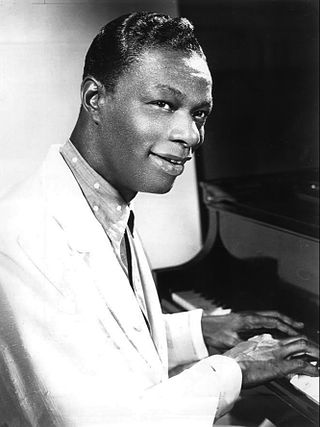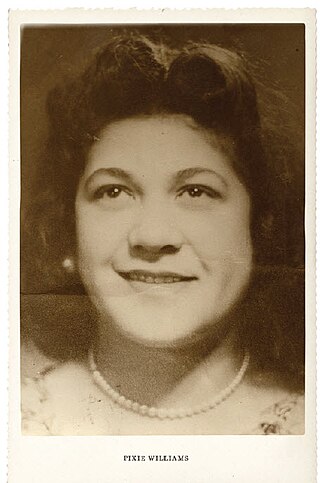Related Research Articles

The music of New Zealand has been influenced by a number of traditions, including Māori music, the music introduced by European settlers during the nineteenth century, and a variety of styles imported during the twentieth century, including blues, jazz, country, rock and roll, reggae, and hip hop, with many of these genres given a unique New Zealand interpretation.
The Sons of the Pioneers are one of the United States' earliest Western singing groups. Known for their vocal performances, their musicianship, and their songwriting, they produced innovative recordings that have inspired many Western music performers and remained popular through the years. Since 1933, through many changes in membership, the Sons of the Pioneers have remained one of the longest-surviving country music vocal groups.
Gordon Hill Jenkins was an American arranger, composer, and pianist who was influential in popular music in the 1940s and 1950s. Jenkins worked with The Andrews Sisters, Johnny Cash, The Weavers, Frank Sinatra, Louis Armstrong, Judy Garland, Nat King Cole, Billie Holiday, Harry Nilsson, Peggy Lee and Ella Fitzgerald.
"Too Young" is a popular song, with music written by Sidney Lippman and lyrics by Sylvia Dee. A recording of the song was released by Nat King Cole in 1951, which reached No. 1 in the United States and became the best-selling song of the year. The song was an early attempt by music labels to appeal to the younger demographics and its success later led to a boom of music that caters to the young. Another successful version was released by Donny Osmond in 1972.
Frederick Emil Ahlert was an American composer and songwriter.
Irving A. Aaronson was an American jazz pianist and big band leader. Aaronson's orchestra was one of the most popular in America during the Roaring Twenties. His most popular song, "The Loveliest Night of the Year", was not recorded with his band but was adapted by Aaronson in 1950 for the Mario Lanza film The Great Caruso.
Alice Rose Provensen and Martin Provensen were an American couple who illustrated more than 40 children's books together, 19 of which they also wrote and edited. According to Alice, "we were a true collaboration. Martin and I really were one artist."

"Mona Lisa" is a popular song written by Ray Evans and Jay Livingston for the Paramount Pictures film Captain Carey, U.S.A. (1949), in which it was performed by Sergio de Karlo and a recurrent accordion motif. The title and lyrics refer to the renaissance portrait Mona Lisa painted by Leonardo da Vinci. The song won the Academy Award for Best Original Song in 1950.

Hal McIntyre was an American saxophonist, clarinetist, and bandleader.
TANZA was a pioneering New Zealand record label, from 1949 to 1956. TANZA stands for To Assist New Zealand Artists, and was the first company to record and produce records in New Zealand. The majority were 78 rpm records, with some 45 rpm records and LPs produced from 1952.
Mornington is a former parliamentary electorate from 1946 to 1963, centred on the suburb of Mornington in the city of Dunedin, New Zealand.
Bill Wolfgramm aka Bill Wolfgramme was a musician specialising in lap steel guitar and popular Hawaiian music. He was born in the island kingdom of Tonga and was also of German descent. He is the former leader of Bill Wolfgramm & His Islanders, a popular island band in New Zealand that played regularly at the Orange Ballroom, a historic dance venue in Auckland.
Foy Willing was an American singer, songwriter, musician, and bandleader, who performed Western music and appeared in Western movies. He formed the band Riders of the Purple Sage.
Colin James Wilson was a New Zealand musician, singer, songwriter and railway worker born in Dunedin. As a guitarist and vocalist for his group Cole Wilson And His Tumbleweeds, he performed and made recordings spanning almost 40 years.

Pikiteora Maude Emily Gertrude Edith "Pixie" Williams was a New Zealand singer best known for the song "Blue Smoke", recorded in 1949. In 2019, she was inducted into the New Zealand Music Hall of Fame.
William George Ditchfield was a New Zealand musician and cricketer. He played one first-class cricket match for Otago in 1933/34.
The 2017 APRA Silver Scroll Awards were held on Thursday 28 September 2017 at the Dunedin Town Hall in Dunedin, celebrating excellence in New Zealand songwriting. This was the first time the awards had been hosted in Dunedin.
Arthur Lesle Wilson was a New Zealand musician and singer–songwriter who performed as Les Wilson and "The Otago Rambler". He began performing on stage at the age of nine, and from the 1950s was a country-music singer and songwriter, often performing with his wife, Jean Calder (c.1929–2019). He was billed as "Dunedin's own Tex Morton".
John Brynn Christie was a New Zealand musician who had brief prominence in the early 1950s. He was the first New Zealand country musician to be recorded and the third musician to have an official release on the newly formed TANZA label.
References
- ↑ Bourke, C., "Country music pioneers, 1920s to 1940s," Te Ara Encyclopedia of New Zealand, 22 October 2014. Retrieved 12 July 2022.
- ↑ "The Tumbleweeds". AudioCulture. 9 November 2013. Retrieved 12 July 2022.
- ↑ "The Tumbleweeds". AudioCulture. 9 November 2013. Retrieved 12 July 2022.
- ↑ "Popular music in New Zealand from 1900 to today," christchurchcitylibraries.com. Retrieved 12 July 2022.
- ↑ Stephen Latty (1988). Maple on the Hill - The Untold Story of the Tumbleweeds (television documentary). Dunedin.
- ↑ "Hands of Fame induction," goldguitars.co.nz. Retrieved 12 July 2022.